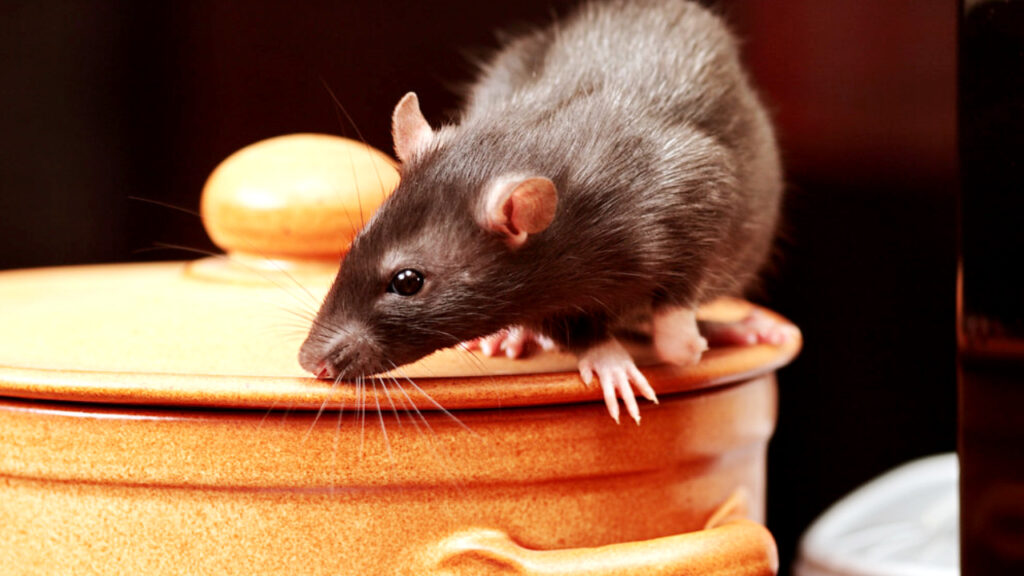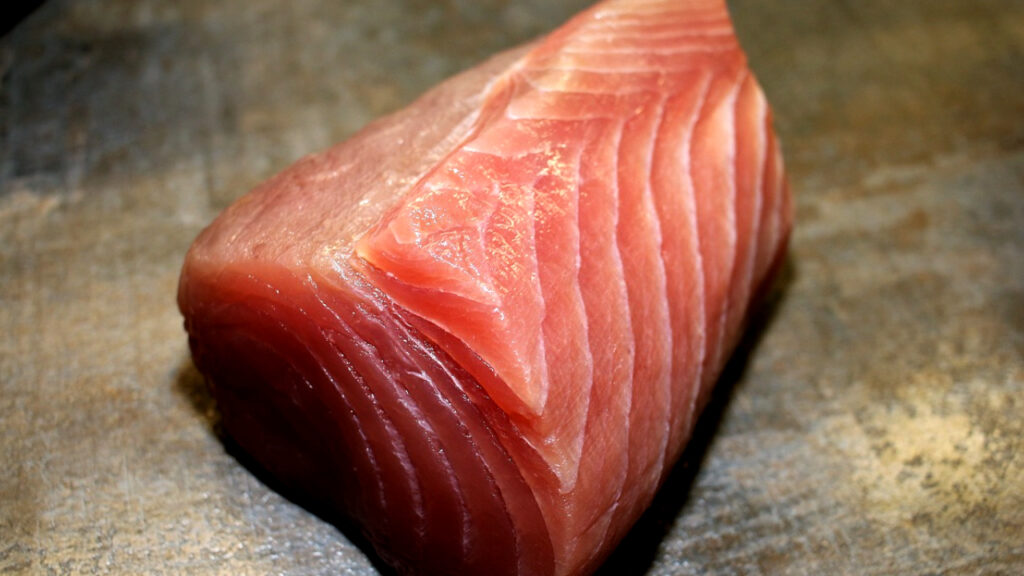
Tuna is a type of saltwater fish that belongs to the Thunnini tribe. It’s widely consumed by humans and comes in various species, including albacore, yellowfin, and skipjack. Tuna is known for its lean and firm flesh, making it a popular choice for consumption.
But can rats eat tuna too?
In short, yes rats can eat tuna, in moderation. Tuna, especially canned varieties, can be high in salt, and overconsumption of salt can be harmful to rats. It’s essential to offer tuna as an occasional treat in moderation, keeping in mind the size and nutritional needs of pet rats.
So, should you feed tuna to your rats?
Let’s find out!
Table of Contents
Can Rats Eat Tuna?
Well, rats can eat tuna, but there’s a little catch. While tuna itself is fine, you have to be careful if it’s the kind that humans usually eat—like from a can.
The reason is that these types of tuna can be too salty for our little rat friends.
Rats are really small, and too much salt isn’t good for them. It’s a bit like if you ate too many salty snacks; it might not be healthy for you.
So, if you want to share some tuna with your rat, make sure it’s a small amount, and maybe even get the kind that’s in water instead of oil. This way, your rat can have a tasty treat without worrying about too much salt.
Just like with any new food, it’s always a good idea to introduce it slowly to see how your rat reacts.
And, of course, if you ever have any doubts or if your rat seems unwell, it’s best to check with a vet or someone expert in small animals.
How Much Tuna Can Rats Have?
While rats can enjoy tuna as an occasional treat, it’s important to be mindful of the quantity due to the salt content.
Too much salt can be harmful to rats, just like it can be for humans.

For adult rats, a small amount, such as a teaspoon or two, is generally sufficient for a treat. Remember, rats are small animals, and even a little bit of human food can be a significant portion for them.
Opt for tuna with lower salt content, and if possible, choose tuna packed in water rather than oil. Always check the label to see if it mentions the salt content. High salt levels can lead to health issues, so it’s crucial to minimize their intake.
Is Tuna Good for Rats?
Tuna can be considered a good treat for rats when offered in moderation and prepared appropriately. It provides certain nutritional benefits.
A typical serving of tuna (3-ounce serving) contains:
- Calories: 100 kcal
- Protein: 22 grams
- Total Fat: 1 gram
- Omega-3 Fatty Acids: 500 milligrams
Other health benefits of tuna may include:
High Protein
Tuna is a good source of protein, which is essential for muscle development, growth, and overall health in rats.
Omega-3 Fatty Acids
Tuna, particularly varieties like salmon, contains omega-3 fatty acids, which contribute to heart and brain health.
Vitamins and Minerals
Tuna provides various vitamins and minerals, including vitamin D, vitamin B12, and selenium, which are important for a rat’s overall well-being.
Risks of Overfeeding Tuna to Rats
Tuna may have a lot of nutritional value but overfeeding isn’t good!
Overfeeding tuna to rats can pose several risks, primarily due to the high salt content and other potential issues.
Here are some of the risks of overfeeding tuna to rats:
Too Much Salt
Tuna, especially canned varieties, can be quite salty. Rats are small animals, and excessive salt intake can lead to health problems such as increased thirst, dehydration, and kidney issues.
Over time, high salt levels can contribute to hypertension and other cardiovascular problems.
Risks of Mercury
Tuna, particularly larger species like albacore, can contain higher levels of mercury. Chronic exposure to high levels of mercury can be harmful to the nervous system.
Thiamine Deficiency
Overfeeding any fish, including tuna, can lead to a thiamine (Vitamin B1) deficiency. Thiamine is crucial for neurological health, and a deficiency can result in symptoms like lethargy, weakness, and neurological issues.
Digestive Issues
Too much tuna, especially if it’s not properly cooked or prepared, can lead to digestive problems in rats.
This includes issues like diarrhea, vomiting, and discomfort.
Thus, it’s important to offer tuna as an occasional treat in moderate amounts. Additionally, choose lower-sodium varieties, preferably packed in water instead of oil.
Always cook the tuna thoroughly to reduce the risk of bacterial and parasitic infections.
Can Rats Eat Raw Tuna?

Feeding rats raw tuna is generally not recommended.
While many animals, including humans, can safely eat raw fish, it’s not recommended for some reasons.
Firstly, raw tuna might be hard on your rat’s stomach.
Cooking makes the proteins in fish more digestible for rats. Raw fish may be harder for them to digest, and improper digestion can lead to gastrointestinal issues.
Also, raw fish, including tuna, can harbor parasites and harmful bacteria that may not be present in properly cooked fish.
Cooking the fish thoroughly helps eliminate these potential risks.
Thus, if you want to give your rats tuna, it’s safer to offer it cooked. Boiling or baking the tuna thoroughly is the best without added salt or spices.
Can Rats Eat Canned Tuna?
Rats can eat canned tuna but it’s not recommended.
The tuna that comes in cans for people can be high in salt, and too much salt is not good for rats.
Rats are tiny compared to us, so they don’t need as much salt in their diet. If they eat too much salty food, it can make them sick.
And don’t forget the preservatives!
They are harmful too
So, if you want to share some canned tuna with your rat, it’s best to give them a small amount and make sure it’s not packed in too much salt. You can check the label on the can to see if it mentions the salt content.
Also, if the tuna is in oil, it’s a good idea to drain off the oil before giving it to your rat. Rats need a balanced diet, and too much oil isn’t great for them either.
Can Baby Rats Eat Tuna?
When it comes to baby rats, we need to be a bit more cautious about what they eat.
While adult rats can have tuna in moderation, it’s generally not recommended to give tuna, especially canned tuna, to baby rats.
The main concern is the high salt content in canned tuna. Baby rats, just like human babies, have developing systems that are more sensitive to certain foods. Too much salt can be hard on their tiny bodies and might lead to health problems.
For baby rats, it’s best to stick to their regular diet, which is typically a commercial rat food that’s designed to meet their nutritional needs. As they grow older and their systems become more robust, you can gradually introduce small amounts of safe and healthy treats into their diet.
So, tuna for baby rats is a big no-no!
Preparing Tuna for Rats
Preparing tuna for rats is easy.
But it’s important to do it in a manner to ensure that it’s safe, nutritious, and well-suited for their small digestive systems.
Here’s a simple process:
- Choose the Right Tuna: Opt for tuna packed in water rather than oil, as this reduces the fat content. Also, choose varieties with lower salt levels, as excessive salt can be harmful to rats.
- Cooking it: It’s advisable to cook the tuna before offering it to your rats. Boiling or baking are good methods to use.
- Remove Bones: If you are using fresh fish or a variety with bones, make sure to remove all bones. Rats can have difficulty digesting bones, and bones can pose a choking hazard.
- Cut into Small Pieces: Rats are small animals, and their food should be appropriately sized. Cut the tuna into small pieces to make it easy for them to eat.
Remember,tuna or any fish should only be given as an occasional treat!
This helps prevent potential health issues associated with overfeeding.
Lastly,if you notice any adverse reactions or changes in behavior after introducing tuna into your rats’ diet, consult with a veterinarian promptly.
Other Fish Treats for Your Rats
Rats can enjoy a variety of fish treats in moderation.
Here are some safe and healthy options:
- Salmon: Cooked salmon is a good source of omega-3 fatty acids, which are beneficial for the rats’ health. Make sure it’s boneless, plain, and cooked without any added seasonings.
- Tilapia: Tilapia is a mild fish that can be given to rats as a treat. Like with other fish, it should be cooked thoroughly, and any bones should be removed.
- Whitefish: Whitefish, such as cod or haddock, can be offered to rats as long as it’s cooked and doesn’t contain any added spices, herbs, or oils.
- Anchovies: These small, oily fish are rich in nutrients. If you choose to give your rats anchovies, ensure they are plain and low in salt.
Remember to always cook the fish to eliminate any potential parasites or bacteria. It’s crucial to serve the fish in small, manageable pieces without any bones, as rats can be sensitive to bones.
Also, if you notice any unusual reactions after introducing a new treat. It’s best to stop feeding it further and consult a vet if necessary.
Final Thoughts
To sum up rats can enjoy tuna as an occasional treat!
But it’s crucial to approach it with caution. Tuna, especially canned varieties, can be high in salt, and overfeeding can lead to health issues such as dehydration and kidney problems.
Choosing tuna packed in water, cooking it thoroughly, and removing bones are essential steps to make it safe for rats.
Remember to keep portions small, cut the tuna into pieces, and offer it occasionally. A balanced and nutritionally complete commercial rat food should remain the primary component of their diet.
Happy feeding!
Here are more helpful articles on rats:
